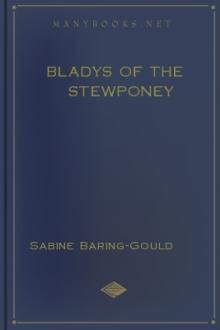The Broom-Squire, Sabine Baring-Gould [books to read this summer txt] 📗

- Author: Sabine Baring-Gould
Book online «The Broom-Squire, Sabine Baring-Gould [books to read this summer txt] 📗». Author Sabine Baring-Gould
CHAPTER XVI.
AGAIN-IVER.
A few days after this first visit, Iver was again at the Kinks' farm.
The weather was fine, and he protested that he must take advantage of it to proceed with his picture.
Mehetabel was reluctant to stand. She made excuses that were at once put aside.
"If you manage to sell pictures of our place," said Bideabout, "our Punch-Bowl may get a name, and folk come here picnicking from Godalming and Guildford and Portsmouth; and I'll put up a board with Refreshments--Moderate, over the door, and Matabel shall make tea or sell cake, and pick up a trifle towards; housekeeping."
A month was elapsed since Mehetabel's marriage, the month of honey to most--one of empty comb without sweetness to her. She had drawn no nearer to her husband than before. They had no interests, no tastes in common. They saw all objects through a different medium.
It was not a matter of concern to Mehetabel that she was left much alone by Jonas, and that her sister-in-law and the rest of the squatters treated her as an interloper.
As a child, at the Ship, without associates of her own age, after Iver's departure, she had lived much to herself, and now her soul craved for solitude. And yet, when she was alone the thoughts of her heart troubled her.
Jonas was attached, in his fashion, to his beautiful wife; he joked, and was effusive in his expressions of affection. But she did not respond to his jokes, and his demonstrations of affection repelled her. Jonas was too dull, or vain, to perceive this, and he attributed her coldness to modesty, real or affected, probably the latter.
Mehetabel shrank from looking full in the face, the thought that she must spend the rest of her life with this man. She was well aware that she could not love him, could hardly bring herself to like him, the utmost she could hope was that she might arrive at enduring him.
Whilst in this condition of unrest and discouragement, Iver appeared, and his presence lit up the desolation in which she was. The sight of him, the sound of his voice, aroused old recollections, helped to drive away the shadows that environed her, and that clouded her mind. There was no harm in this, and yet she was uneasy. Cheerful as she was when he was present, there was something feverish in this cheerfulness, and it left her more unhappy than before when he was gone, and more conscious of the impossibility of accommodating herself to her lot.
The visit on one fine day was followed by another when the rain fell heavily.
Iver entered the house, shook his wet hat and cloak, and with a laugh, exclaimed--
"Here I am--to continue the picture."
"In such weather?"
"Little woman! When I started the wind was in the right quarter. All at once it veered round and gave me a drenching. What odds? You can stand at the window, and I can proceed with the figure. It was tedious at the Ship. Between you and me and the post, I cannot get along with the fellows who come there to drink. You are the only person in Thursley with whom I can talk and be happy."
"Bideabout is not at home."
"I didn't come through the rain to see Bideabout, but you."
"Will you have anything to eat or drink?"
"Anything that you can give me. But I did not come for that. To tell the truth, I don't think I'll venture on the picture. The light is so bad. It is of no consequence. We can converse. I am sick of public-house talk. I ran away to be with you. We are old chums, are we not, dear Matabel?"
A fire of peat was on the hearth. She threw on skin-turf that flamed up.
Iver was damp. His hands were clammy. His hair ends dripped. His face was running with water. He spread his palms over the flame, and smiled.
"And so you were tired of being at home?" she said, as she put the turves together.
"Home is no home to me, now you are gone," was his answer.
Then, after a pause, during which he chafed his hands over the dancing flame, he added: "I wish you were back in the old Ship. The old Ship! It is no longer the dear old Ship of my recollections, now that you have deserted. Why did you leave? It is strange to me that my mother did not write and tell me that you were going to be married. If she had done that--"
He continued drying his hands, looking dreamily into the flame, and left the sentence incomplete.
"It is queer altogether," he pursued. "When I told her I was at Guildford, and proposed returning, she put me off, till my father was better prepared. She would break the news to him, see how--he took it, and so on. I waited, heard no more, so came unsummoned, for I was impatient at the delay. She knew I wished to hear about you, Mattee, dear old friend and playmate. I asked in my letters about you. You know you ceased to write, and mother labored at the pen herself, finally. She answered that you were well--nothing further. Why did she not tell me of your engagement? Have you any idea, Matabel?"
She bowed over the turf, to hide her fate, but the leaping flame revealed the color that mantled cheek, and throat, and brow. Her heart was beating furiously.
"That marriage seems to me to have been cobbled up precious quickly. Were you so mighty impatient to have the Broom-Squire that you could not wait till you were twenty? A girl of eighteen does not know her own mind. A pretty kettle of fish there will be if you discover, when too late, that you have made a mistake, and married the wrong man, who can never make you happy."
Mehetabel started upright, and went with heaving bosom to the window, then drew back in surprise, for she saw the face of Mrs. Rocliffe at the pane, her nose applied to and flattened against the glass, and looking like a dab of putty.
She was offended at the woman's inquisitiveness, and went to the door to inquire if she needed anything.
"Nuthin' at all," answered Sarah, with a laugh, "except to see whether my brother was home. It's early days beginning this, I call it."
"What do you mean?"
"Oh, nuthin'."
"Iver is here," said Mehetabel, controlling herself. "Will you please to come in?"
"But Jonas is not, is he?"
"No; he has gone to Squire Mellers about a load of stable-brooms."
"I wouldn't come in on no account," said Mrs. Rocliffe. "Two's company, three's none," and she turned and departed.
After she had shut the door Mehetabel went hastily through the kitchen into the scullery at the back. Her face was crimson, and she trembled in all her joints.
Iver called to her; she answered hastily that she was engaged, and presently, after she had put bread and cake and butter on the table, she fled to her own room upstairs, seated herself on a chair, and hid her burning face in her apron.
The voice of her husband below afforded sensible relief to her in her mortification. He was speaking with Iver; cursing the weather and his bad luck. His long tramp in the rain had been to no purpose. The Squire, to whose house he had been, was out. She washed her face, combed and smoothed her hair, and slowly descended the stairs.
On seeing her Jonas launched forth in complaints, and showed himself to be in an evil temper. He must have ale, not wish-wash tea, fit only for old women. He would not stuff himself with cake like a school child. He must have ham fried for him at once.
He was in an irritable mood, and found fault with his wife about trifles, or threw out sarcastic remarks that wounded, and made Iver boil with indignation. Jonas did not seem to bear the young artist a grudge; he was, in fact, pleased to see him, and proposed to him to stay the evening and have a game of cards.
It was distressing to Mehetabel to be rebuked in public, but she made no rejoinder. Jonas had seized on the opportunity to let his visitor see that he was not tied to his wife's apron string, but was absolute master in his own house. The blood mounted to Iver's brow, and he clenched his hands under the table.
To relieve the irksomeness of the situation Iver proceeded to undo a case of his colored sketches that he had brought with him.
These water-colors were charming in their style, a style much affected at that period; the tints were stippled in, and every detail given with minute fidelity. The revolution in favor of blottesque had not yet set in, and the period was happily far removed from that of the impressionist, who veils his incapacity under a term--an impression, and calls a daub a picture. Nature never daubs, never strains after effects. She is painstaking, delicate in her work, and reticent.
Whilst Mehetabel was engaged frying ham, Iver showed his drawings to the Broom-Squire, who treated them without perception of their beauty, and valued them solely as merchandise. But when supper was ready, and whilst Jonas was eating, he had a more interested and appreciative observer in Mehetabel, to whom the drawings afforded unfeigned pleasure. In her delight she sat close to Iver; her warm breath played over his cheek, as he held up the sketches to the light, and pointed out the details of interest.
Once when these were minute, and she had to look closely to observe them, in the poor light afforded by the candle, without thinking what he was about, Iver put his hand on her neck. She started, and he withdrew it. The action was unobserved by Bideabout, who was engrossed in his rasher.
When Jonas had finished his meal, he thrust his plate away, produced a pack of cards, and said--
"Here, Mr. Iver, are pictures worth all of yours. Will you come and try your luck or skill against me? We'll have a sup of brandy together. Matabel, bring glasses and hot-water."
Iver went to the door and looked out. The rain descended in streams; so he returned to the table, drew up his chair and took a hand.
When Mehetabel had washed the plates and dishes used at the meal, she seated herself where she could see by the candle-light, took up her needlework, and was prepared to snuff the wick as was required.
Iver found that he could not fix his attention on the game. Whenever Mehetabel raised her hand for the snuffers, he made a movement to forestall her, then sometimes their eyes met, and she lowered hers in confusion.
The artistic nature of Iver took pleasure in the beautiful; and the features, coloring, grace of the young Broom-Squiress, were such as pleased him and engaged his attention. He made no attempt to analyze his feelings towards her. He was not one to probe his own heart, nor had he the resolution to break away from temptation, even when recognized as such. Easy-going, good-natured, impulsive, with a spice





Comments (0)